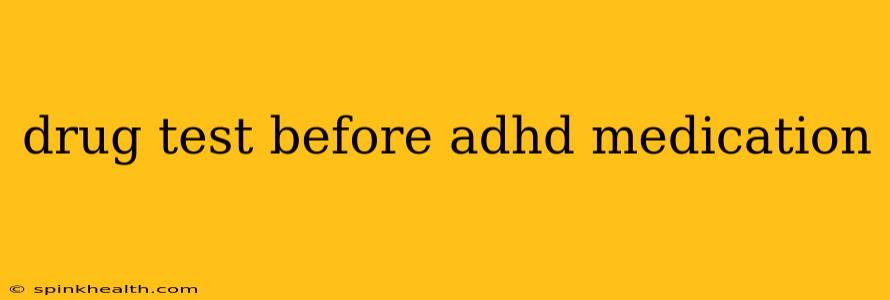The diagnosis and treatment of ADHD often involve a crucial first step: a drug test. This can feel daunting, but understanding the reasons behind it and the process itself can ease anxieties. This isn't about suspicion; it's about responsible care and ensuring the best possible treatment plan. Let's delve into the specifics.
Why is a Drug Test Required Before Starting ADHD Medication?
This is a question many patients ask, and it's entirely valid. The primary reason for a drug test before prescribing ADHD medication isn't to accuse anyone of substance abuse. Instead, it’s a crucial part of establishing a clear baseline and creating a safe and effective treatment plan. Doctors need to ensure the medication will interact safely with any other substances already present in the body. This includes:
- Identifying potential interactions: Certain drugs can interact negatively with ADHD medication, leading to potentially dangerous side effects. A drug test helps identify these interactions proactively.
- Ensuring accurate diagnosis: Some substances can mimic ADHD symptoms, leading to a misdiagnosis. A drug test helps rule out these possibilities and ensure the ADHD diagnosis is accurate.
- Monitoring treatment efficacy: Regular drug tests, post-diagnosis, can help track the patient's adherence to their medication plan and ensure the medication is working effectively.
- Promoting patient safety: This is paramount. The doctor needs a complete picture of a patient's health to mitigate the risk of adverse reactions or complications from the medication.
What Substances Are Typically Tested For?
The specific substances tested for can vary by doctor and clinic, but typically include:
- Amphetamines and Methamphetamines: These are present in many ADHD medications, so a baseline is essential to avoid false positives.
- Opiates: These can have significant interactions with ADHD medications.
- Benzodiazepines: Similarly, these can interact negatively with ADHD medications.
- Cocaine: The presence of cocaine necessitates a different approach to treatment.
- Marijuana: Although views on marijuana are changing, its interaction with ADHD medications needs to be considered.
- Other substances: Depending on the patient's history or the doctor's assessment, other substances may be included in the testing.
What Happens During a Drug Test?
Drug tests for this purpose are usually non-invasive. The most common methods include:
- Urine test: This is a widely used, relatively inexpensive, and non-invasive method.
- Saliva test: A saliva test is also quick and easy.
The process is typically straightforward: a sample is collected, sent to a lab, and results are provided to the prescribing doctor within a few days.
What if I Test Positive for a Substance?
A positive test doesn't automatically disqualify you from receiving ADHD medication. The doctor will discuss the results with you, explore the reasons for the positive test, and consider how to proceed safely. Open and honest communication is key in this situation. The doctor might:
- Adjust the medication: The dosage or type of medication might need adjusting to account for the other substance.
- Recommend additional treatment: Addressing the underlying cause of the substance use may be necessary before initiating ADHD treatment.
- Defer medication: In some cases, addressing the positive result may need to take priority before starting ADHD medication.
How Can I Prepare for a Drug Test?
Preparation is straightforward: Be honest and upfront with your doctor about any medications, supplements, or substances you are using. This open communication facilitates the safest and most effective treatment plan.
Is the Drug Test Private and Confidential?
The results of your drug test are confidential and protected by HIPAA regulations. Your doctor is bound by those regulations, and sharing this sensitive information with anyone without your consent would be a violation.
In conclusion, the drug test before starting ADHD medication is a crucial safety precaution, not a judgment. It allows for a responsible and tailored treatment plan, ensuring your safety and maximizing the effectiveness of your medication. Open communication with your doctor is essential throughout this process.

